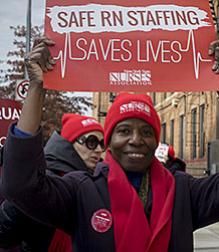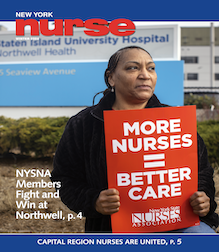INTENT
The intent for the development in 1988 of the New York State Nurses Association (NYSNA) Position Statement on Abortion was in response to the increasing legislative activity concerning abortion law, as well as requests from the professional nursing community with regard to their rights and responsibilities and the rights of their patients pertaining to the issue of abortion. NYSNA has, through the Council on Ethics and Human Rights and its Nursing Education and Practice Department, continued to study and research the issues surrounding abortion and reaffirms the position of the rights of women as patients and nurses.
Note: The use of the term “patient” anywhere in this document is intended to be generic and refers to the recipient of nursing care.
DEFINITIONS
Abortion: The spontaneous or induced termination of pregnancy before the fetus reaches a viable age (Taber’s, 2010). The termination of a pregnancy after, accompanied by, resulting in, or closely followed by the death of the embryo or fetus (Merriam-Webster, 2010).
Therapeutic abortion: Performed when the pregnancy endangers the mother's mental or physical health or when the fetus has a known condition incompatible with life (Taber’s, 2010). Abortion induced when pregnancy constitutes a threat to the physical or mental health of the mother (Merriam-Webster, 2010).
Spontaneous abortion: Abortion occurring without apparent cause (Taber’s, 2010).
Naturally occurring expulsion of a nonviable fetus (Merriam-Webster, 2010).
Miscarriage: Lay term for termination of pregnancy at any time before the fetus has attained the potential for extra-uterine viability (Taber’s, 2010). Spontaneous expulsion of a human fetus before it is viable and especially between the 12th and 28th weeks of gestation (Merriam-Webster, 2010).
POSITION
The following statements constitute NYSNA’s position on abortion:
Patients’ Rights include:
- Patients’ and their physicians have individual rights to decide if they will bear a child and, under the law, they may decide to have a legal abortion.
- Patients’ have the right to information regarding alternative procedures to an abortion.
- Patients’ who choose to have a legal abortion have a right to a timely procedure, as well as to competent, supportive care, both physical and psychological.
- Patients’ who choose to have a legal abortion have a right to freedom from imposition of other's beliefs or judgmental attitudes.
- Patients’ who choose to have a legal abortion have a right to information and counseling in an environment where there is mutual trust and personalized care before, during and after the abortion is performed.
- Patients’ who choose to have a legal abortion have a right to receive care in an environment that provides privacy, culturally appropriate, and specific nursing expertise.
Registered Professional Nurses' Rights and Responsibilities include:
- The responsibility and obligation to provide competent and supportive nursing care.
- The responsibility to provide the patient with objective information and to offer access to resources before, during and after a voluntary termination of pregnancy.
- The responsibility to provide care without imposing personal beliefs on patients who choose to abort.
- The responsibility to not choose to work in those clinical areas where the care of patient’s choosing abortions are usually admitted, when such a procedure is against the individual nurse’s moral, ethical and religious beliefs.
- The obligation for educational preparation, and the responsibility to obtain such, to assist and meet the emotional, physical and psychological needs of patients who are considering or have had a voluntary termination of pregnancy.
- The right to their own moral, ethical and religious beliefs.
- The right to refuse to participate in a voluntary termination of pregnancy, except in an emergency situation or where no other nurses is available, where the patient's needs do not allow for substitution.
- The right not to be subjected to coercion, censure or discipline for appropriate reasons for refusal.
- The right not to be floated into clinical areas where the care of patient’s choosing abortions are usually admitted.
BACKGROUND
New York State Nurses Association (NYSNA) recognizes that the 1973 decision of the United States Supreme Court in Roe versus Wade to legitimize abortion remains a controversial issue (Roe v. Wade, 410 U.S. 113 (1973)).
Advocacy groups on both sides continue to debate their points of view. NYSNA believes that the rights of both the patient and nurses must be taken into consideration. “The nature of abortion and the decision-making process it involves can be particularly sensitive issues for all involved. The abortion debate is not a simple one and is not reducible to simplistic pro-choice or pro-life standpoints. It is essential that health professionals understand the issues behind the arguments and are able to support and inform their patients when required” (Chaloner, 2007, p.48).
The role and responsibility of the nurse as well as the rights of patients are supported within law, and within the ethical framework provided by the American Nurses Association Code of Ethics for Nurses with Interpretive Statements (2015).
RECOMMENDATIONS
The New York State Nurses Association supports the following actions for registered professional nurses with regard to abortion procedures:
- In recognition of an equal right to privacy and personal dignity, no patient should be subjected to prejudicial attitudes or undue pressure on the part of nurses regarding a private individual decision on abortion.
- No individual patient or group of patients should be left unattended or uncared for in any stage of an abortion procedure. All efforts should be made by health administrators to provide the patient with services of registered professional nurses who do not object to the concept of abortion.
- Registered professional nurses who object to participating in abortion procedures and/or caring for patients before or after the procedure are obligated by law to make their specific objections known, in writing, to their employers (Gould’s Consolidated Laws of New York, 2004).
- Registered professional nurses who object to direct counseling of the patient seeking abortion are obliged to refer the patient to the agency or provider where counseling can be obtained.
- Nurses have a responsibility to not seek employment in an area where abortions are likely to be performed when that nurse personally opposes abortion and would likely recuse themselves from assisting in such procedures.
Approved by the Board of Directors on May 18-19, 1988; March, 1990; September 15, 2004; September 15, 2010.
Reviewed/Revised by the Councils on Ethical Practice and Human Rights on August 27, 2004.
Reviewed/Revised by the Councils on Ethical Practice and Human Rights on March 12, 2010.
Revised: February 15, 2018
REFERENCES
American Nurses Association (1996). Position statement on reproductive health. Washington,
DC: Author.
American Nurses Association (2015). Code of ethics for nurses with interpretive statements.
Silver Springs MD: Author.
Chaloner, J. K. (2007). Ethics of abortion: The arguments for and against. Nursing Standards,
21(37), 45-48.
Gould’s Consolidated Laws of New York (2004). Chapter 6-Civil Rights Law, Article 7-
Miscellaneous rights, Section 79-1 Discrimination against persons who refuses to perform
certain acts prohibited.
Merriam-Webster Medical On-line Dictionary (2010). Retrieved from
http://www.merriam-webster.com/dictionary/abortion
New York State Nurses Association (1989). Resolution on reproductive health services. Latham,
NY: Author.
Roe v. Wade, 410 U.S. 113 (1973).
Taber’s online dictionary (2010). Retrieved from http://www.tabers.com/tabersonline/ub
Taber’s dictionary (2001).




